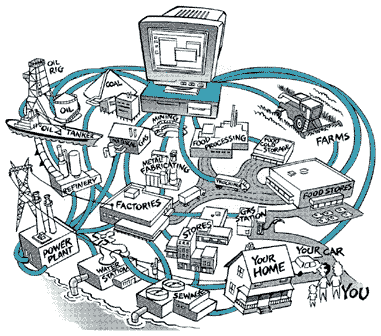




 |
 |
 |
 |
 |
Protecting Against Computer Chaos August 1998 |

by Paul Glover Normal life could continue beyond January 1, 2000. However, there's strong evidence that disruptions of food and fuel supplies could bring us a colder, hungrier winter. That's because our national economy is thoroughly dependent on computers to manufacture, transport and count everything. And many corporate and government computers have been trained to believe that year 2000 is 1900. Those that do would shut down or spread malfunction. While the national economy depends on computers, the local economy could, with genuine planning, carry us through serious disruptions of national supplies. Here's what could happen, and what Ithaca can do to become secure. Some of these proposed solutions may seem extraordinary; they but reflect potentially severe situations. FuelWithout fuel, our food would not travel to stores, water would not move to hydrants or homes, telephones would silence, buildings would freeze, and cars would stop. When enough computers collapse, life will get very tough, because computers manage the extraction, refining, transport of and payment for fuels. They manage the manufacture of the myriad tools needed for these processes. Assuming our top priorities are to provide food, water and warmth, we can do several things: TO RETAIN WARMTH: Our prime effort (beyond weatherization) should be to superinsulate housing, which reduces residential fuel consumption by up to 87%. INHS has already created such a model here. The Finger Lakes Energy Co-op (FLEC) could put dozens of people to work insulating, by paying them Ithaca HOURS (issued to FLEC as a grant). HOURS would be accepted by every landlord and merchant in the Ithaca area because the City, towns and County would agree to accept HOURS for tax payments. These governments would then pay their employees partly with HOURS. We'd gain secure housing and create dozens of new jobs, while recapturing to the local economy many millions of dollars which would otherwise have gone yearly to NYSEG. These dollars retained would stimulate new business and job creation, which then expands local sales tax collection, which sustains essential public works employment. Residents should be prepared for an extreme emergency also--massive power failure--by organizing to reside in Cornell buildings which are heated by Cornell's own primarily coal-fired power plant, rather than from the national grid. The Cornell campus store, underground, is a model of superinsulation. Cornell's state facilities are owned by the people of New York state, who may need them for something more urgent than study. Larger stockpiles of coal should be laid in at Cornell before Year 2000, to extend the existing 45-day supply. TO PROVIDE FOOD: Since most of our food is cultivated, harvested, processed, packaged, transported and retailed by large corporations which depend on computer linkages, food supplies could become irregular. And prices could rise. If we want to be sure to eat, we should not depend on imported winter food from California and Mexico. Locally, an estimated 80 acres of nonchemical (manure slurry) hydroponic double-walled thermopane greenhousing could grow enough winter vegetables for the population of the City of Ithaca. Buffalo, New York uses industrial wasteland for such purposes (NYT 3/3/98). The likeliest place in the City for this facility would be the Southwest Park. Local survivalists are already stockpiling food, some using the fallout shelters built here during the early 60s. Yet they'd not likely survive the hunger of fellow citizens smashing through their doors. To make sure everyone is fed, the City could create food storage facilities (granaries and root cellars) and contract with regional farms for part of their harvests. Storage facilities could be operated by an independent nonprofit which also contracts with local grocers and sells direct at the Farmer's Market. This is simply an extension of Community-Supported Agriculture (CSA), which has already taken root here. Residential attached solar greenhouses can both capture more heat and produce food. Public support for regional farms is the best investment we can make for our children. Further conversion of topsoil into suburbs is an attack on future generations. We can expand farmland retention by right-to-farm laws, and by removing County taxes from active farms smaller than 100 acres which market 50% of their harvest through local outlets. Were a full food crisis to overtake the nation, local farms, community gardens & greenhouses, aquaculture and urban orchards could keep us alive. The City itself should plant fruit trees and berry bushes. TO PROVIDE WATER: First, water districts should stockpile a year's supply of fuel, while sponsoring water conservation measures. Second, we can cut our need for household water in half by manufacturing waterless composting toilets (which are odorless and create safe topsoil), and by installing cisterns to catch rooftop rainwater. Sounds primitive? Consider the alternatives, with fuel shortage. TO PROVIDE TRANSPORT: Supply of cars and car parts is extensively computerized. Even if GM and Chrysler are ready for 2000, many essential component suppliers will not function beyond 2000. The fueling of cars, trucks, and snowplows also becomes problematic. Transit thus becomes imperative, to move people and goods efficiently. Bus routes can be expanded, but buses have 8-year lifespans and cost $250,000 each. More primary reliance can be placed on trollies for reduced long-term fuel cost (trollies here were once powered by water falling in Six Mile Creek). Railroad grades still exist which connect Stewart Park to Buttermilk Park to South Hill to |
Brooktondale, and which connect Cass Park to Trumansburg, and Cortland to Brooktondale via Cornell. Light rail can be re-installed to connect the West End to Cornell, and can link Lansing and Ithaca along Route 13. Most crosstown trips, especially within the valley, could be conveniently accomplished with bicycles. To do this we'll need safe and separate bike lanes. TO MAINTAIN HEALTH: The physical and emotional stress of this disruption will challenge public health. Conventional medical care itself may be limited by shortages of food, fuel, medicines and money. As if current services were not already too expensive, we must reinforce locally-reliant emergency technologies during any crisis. The Ithaca Health Fund and HOURS have connected hundreds of practitioners and clients via local currency. We intend to start a nonprofit dental clinic and Wellness Center. Personal health is a public health issue. TO PROVIDE HOUSEHOLD SUPPLIES: Many tons of perfectly re-useable clothes and furniture are buried in landfills yearly. Thousands of students throw away computers, top brand clothes and fresh food in unopened containers when they leave town. The Student Recycling Project has already recaptured a fraction of these goods for resale at garage sale prices. Their model can expand with a large storage facility, truck fleet, and retail outlet. FinanceEveryone expects to get paid. Millions of tasks by billions of workers combine to make products which keep us alive. Computers handle a large part of the credit transfers, which entitle workers to obtain food and fuel when it is available. However, many banks are expected to scramble accounts; ATMs may shut down; some credit cards may jam. Even large U.S. banks and corporations which manage to prepare for 2000 can expect to be dragged into confusion by the noncompliant banks of the Third World, and by noncompliant small suppliers. The stock market will likely reflect this chaos: 83% of U.S. Y2K project managers expect the Dow Jones to fall by at least 20% (Y2K Wire 5/15/98). TO SUSTAIN TRADE: When we are forced to produce and trade locally without stable dollars, we will need to expand the supply of local money. Ithaca HOURS directly reflect the value of labor, therefore they can measure local effort without depending on the unpredictable swings in global dollar markets. To trade HOURS independent of dollar prices, we'll need to create a local catalog of Ithaca HOUR values. We could convene a community congress to recommend new HOUR prices for labor and goods, while allowing everyone to negotiate HOUR values independently. The disruption of the macroeconomy might change existing labor priorities. During a severe crisis, essential survival skills, especially physical skills, become more valuable. Thus, one hour of farm work producing food might be more highly paid than one hour of legal advice. In the worst case, without reliable dollars, Ithaca HOURS will function to the extent that Tompkins County becomes self-reliant in the production of necessary goods, and to the extent other communities are prepared to properly issue their own HOURS and trade them with us. Likelier less extreme yet serious disturbance would permit us to expand the HOUR supply more gradually. In either case, we'd be prudent to back HOUR issuance with fundamentals like landholdings, local natural gas drilling rights (by eminent domain), shares in local harvests, etc. This would enable us to readjust the HOUR supply (by commodity redemption) were the dollar supply to regain credibility. Confidence in the expanded HOUR supply could also be secured by local banks which want to contribute to the solvency of the local economy, by backing HOURS, with donations of rental and idle rural landholdings. This would permit us to issue larger HOUR loans at zero percent interest, to jump-start a damaged economy. While current HOUR loans average about 40 HOURS ($400), major loans for essential functions would become available. As priorities, farmers could receive HOUR loans to hire laborers, and essential public works could be maintained. We can maximize local production for local needs by creating an import replacement system, which inventories and connects regional raw materials, skills and markets. HOUR Town, which already provides this service, received unanimous City Council approval for a $35,000 HUD grant to expand these capacities, in 1996, but HUD failed to carry through. Typically, during any serious economic crisis, demand rises for redistribution of wealth from the rich to the poor, by legislation, food riots, and revolutions. If it becomes terribly difficult to be poor here, then it will become inconvenient to be rich here. To ensure an orderly transition which respects all persons and basic property, rather than risking violent upheaval, Ithacans can work together to bring us all through intact. With civic planning, we can have good lives after computers. Maybe even better ones. Glover is founder of Citizen Planners of Los Angeles (1983). He is author of "Where Does Ithaca's Food Come From" (1987) and "Ithaca Power" (Ithaca's fuel supply, 1988), and holds a degree in City Management. |